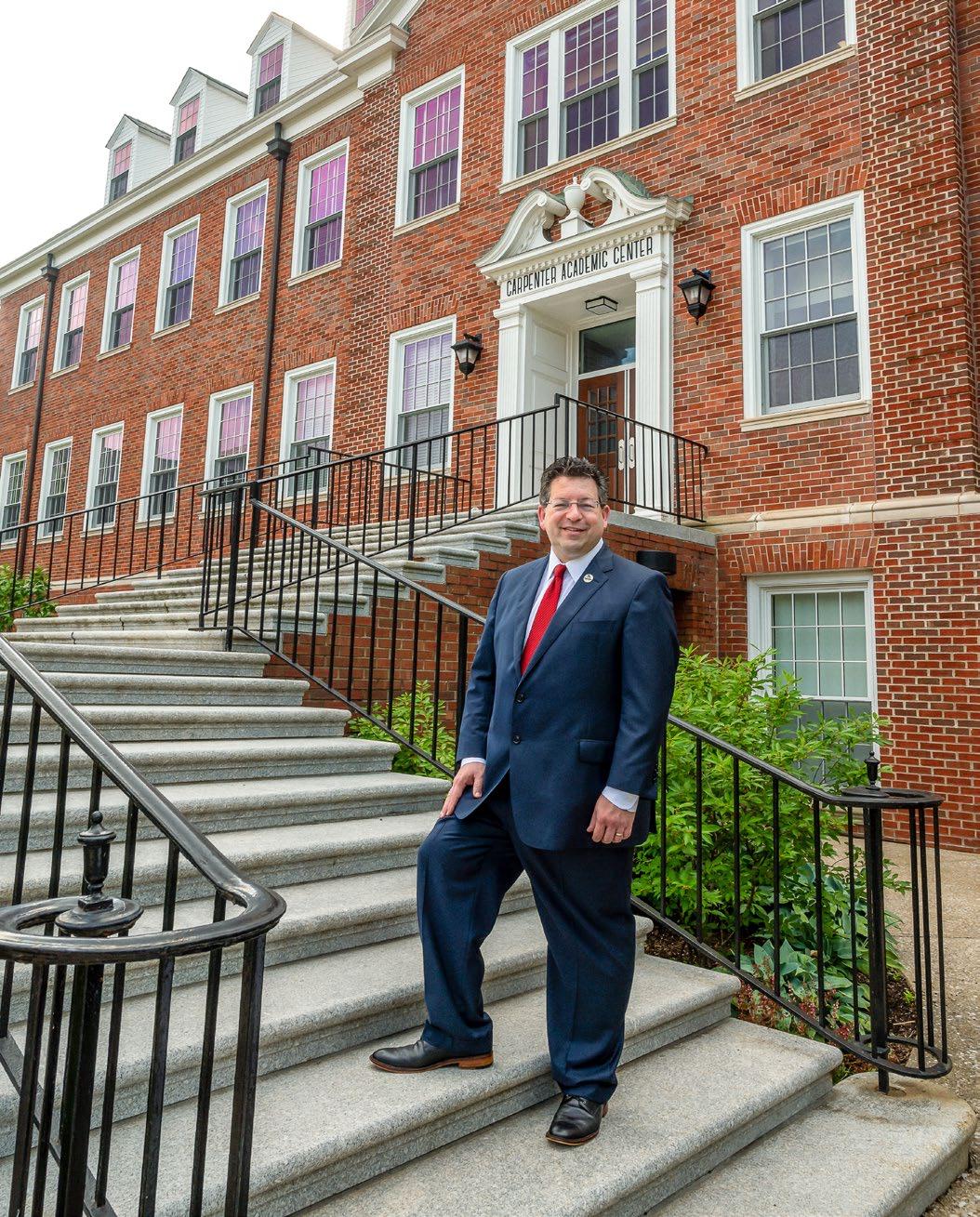
4 minute read
New President Finds Opportunity When Things Don’t Go According to Script
by John Friedlein
The stage lights were on, but the actors pretended they were in total darkness after a fuse had blown.
Advertisement
One of those fumbling around as if he couldn’t see was Brien Lewis. On the first night of this production of “Black Comedy” by acclaimed playwright Peter Shaffer, Lewis went to answer a telephone — but its cord had somehow gotten wrapped around the leg of a chair, so when he pulled the phone the chair slid and blocked his exit. Since he wasn’t supposed to be able to see the chair, he intentionally did a Chevy Chase pratfall over it on his way out. He got a great laugh, and the director worked it into the rest of the shows.
“If something happens onstage that isn’t part of the script, you just have to roll with it,” says Lewis, Transylvania’s new president. This ability to adapt is crucial, whether you’re treading the boards in a community theater or responding to unexpectedchallenges as a college administrator.
The school’s 28th president already has been faced with quite an unexpected challenge. The coronavirus pandemic has turned flexibility into a necessity as universities try to figure out how to educate their students while keeping them healthy this fall.
Let’s start with the silver lining: Students and faculty have gotten a crash course in alternate learning styles and the technologies needed to implement them.
While Lewis realizes this kind of change can be uncomfortable and that professors don’t necessarily want to teach entirely online, they’ve discovered new tools that can enhance and enrich their courses. These technologies might even expand Transylvania’s ability to offer courses to new student populations, such as adult learners with fulltime jobs, or help keep athletes from missing lessons while traveling for away games.
“I think it’s an opportunity to have a very robust exploration of how technology can be infused into what we do, without in any way getting away from the personal attention that’s our hallmark,” Lewis says. Small classes lend themselves to closer relationships with faculty, which in turn help students feel more comfortable engaging in dialogue during teleconferences, for instance.
Actually, Transylvania’s ability to innovate is one of the things that drew Lewis to the school. The 53-year-old from Toronto recently moved to Lexington with his wife, Laura, after serving for eight years as president at another small liberal arts institution, Catawba College in North Carolina. Their son, Josh, is in law school, and daughter, Anna Louise, is a rising junior in college.
Lewis earned his bachelor’s degree in political science from the University of North Carolina at Chapel Hill, where he was student body president and a Morehead Scholar. He went on to attend the University of Toronto for his Juris Doctor (a Swiss Army knife of a degree) and then worked as an attorney and mediator before eventually fulfilling his 20-year plan to become a college president. (It took 22 years, but who’s counting?)
Back when he was UNC’s student body president, serving as an ex officio voting member of the Board of Trustees, he got interested in a wide variety of issues that make a university run.
Since then, he’s also been developing a big-picture sense of how higher education has evolved — a shift from professors as “sages on the stage” simply imparting what they know, to professors as “guides on the side” at a time when we can access vast amounts of human knowledge via the phone in our pocket. “I thinkit does fundamentally change the way we approach education, because it becomes much more about information literacy — about how to access, analyze and synthesize,” Lewis says. “So arguably, the shift has become more toward imparting wisdom than knowledge.”
That ties into one of the priorities for the beginning of his tenure (a rare one that isn’t related to the coronavirus) — that is bringing closure to a long series of discussions about general education innovations. To this point, he wonders: “Are we putting together the right set of requirements and opportunities for students that will prepare them to go out and be adaptable?”
Another immediate, top-of-the-list item for Lewis is “to identify steps we can take to address systemic racism in our community — both in our campus community and our broader community.” Serving on his cabinet and helping him with this is Deidra Dennie, Transylvania’s new vice president for diversity and inclusion. “I’m excited about Dr. Dennie coming in and working with her on those issues,” Lewis says. However, he stressed this clearly isn’t just a “Dr. Dennie task” but will involve the entire campus. “It can’t only be talk — we’ve got to have really specific actions and start moving swiftly. That’s an exciting but daunting challenge.”
This willingness to foster positive change is key to resilience. “A place like Transylvania doesn’t survive for 240 years without being able to adapt and evolve,” Lewis says.

